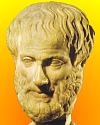
|
Aristotle
(384 B.C. - c. 322 B.C.)
Greek philosopher who presented his thoughts on weather in a book, Meteorologica, which while often wrong, did establish meteorolgy as a distinct discipline for study.
|
Aristotle Quotes on Earth (12 quotes)
>> Click for 111 Science Quotes by Aristotle
>> Click for Aristotle Quotes on | Nature | Physician | Truth |
>> Click for 111 Science Quotes by Aristotle
>> Click for Aristotle Quotes on | Nature | Physician | Truth |
γῆς ἔντερα
[Literally] Earth’s entrails
[or, entrails of earth, or earth’s intestine, or earth’s guts: earthworm. Often seen out of context as “Earthworms are the intestines of the soil.”].
[Literally] Earth’s entrails
[or, entrails of earth, or earth’s intestine, or earth’s guts: earthworm. Often seen out of context as “Earthworms are the intestines of the soil.”].
— Aristotle
Contrary to the widespread quote, Webmaster has not yet found a complete sentence in the original Greek translating as “Earthworms are the intestines of the soil.” Webmaster believes Aristotle did not write such a sentence. As far as Webmaster can figure out, Aristotle had no other word for an earthworm than the descriptive two-word phrase above. The word γῆς translates directly as “earth” and ἔντερα as “intestine.” In the context, Aristotle wrote only this, without any other wording for “earthworm,” in De Generatione Animalium (On the Generation of Animals), Book III, 10, 762b. Identified in Arthur Platt, De Generatione Animalium (1910), unpaginated page 23, end of 762b, footnote 1. The Greek phrase is given in William Keith and Chambers Guthrie, A History of Greek Philosophy: Aristotle, an Encounter (1981), Vol. 4, 290, footnote 3. The context, from the Platt translation is: “For all of these [animals], though they have but little blood by nature, are nevertheless sanguinea, and have a heart with blood in it as the origin of the parts; and the so-called ‘entrails of earth’, in which comes into being the body of the eel, have the nature of a scolex.” The translator footnotes that: “These ‘entrails of earth’ are earthworms almost certainly. A. thinks they are spontaneously generated, and develop into eels.” An alternate interpretation is given by A.L. Peck in Generation of Animals, With an English Translation (1943), 361. “The ‘earth’s-guts’ as they are called have the nature of a larva; the body of the eels forms within them.” Peck footnotes: “The ‘earth’s-guts’ are apparently the round-worm Gordius. Webmaster note: These are hairlike, very long, and very thin, nematoid worms that are parasites—not earthworms. Webmaster concludes that gardeners saying “Earthworms are the intestines of the soil” are quoting something that Aristotle did not say, per se, and he did not specifically talk about earthworms as gardeners’ friends conditioning the soil.
Anaximenes and Anaxagoras and Democritus say that its [the earth’s] flatness is responsible for it staying still: for it does not cut the air beneath but covers it like a lid, which flat bodies evidently do: for they are hard to move even for the winds, on account of their resistance.
— Aristotle
Aristotle, On the Heavens, 294b, 13. In G. S. Kirk, J. E. Raven and M.Schofield (eds), The Presocratic Philosophers: A Critical History with a Selection of Texts (1983), p. 153.
As to the position of the earth, then, this is the view which some advance, and the views advanced concerning its rest or motion are similar. For here too there is no general agreement. All who deny that the earth lies at the centre think that it revolves about the centre, and not the earth only but, as we said before, the counter-earth as well. Some of them even consider it possible that there are several bodies so moving, which are invisible to us owing to the interposition of the earth. This, they say, accounts for the fact that eclipses of the moon are more frequent than eclipses of the sun; for in addition to the earth each of these moving bodies can obstruct it.
— Aristotle
On the Heavens, 293b, 15-25. In Jonathan Barnes (ed.), The Complete Works of Aristotle (1984), Vol. 1, 483.
But the whole vital process of the earth takes place so gradually and in periods of time which are so immense compared with the length of our life, that these changes are not observed, and before their course can be recorded from beginning to end whole nations perish and are destroyed.
— Aristotle
Meteorology, 351b, 8-13. In Jonathan Barnes (ed.), The Complete Works of Aristotle (1984), Vol. I, 573.
It is clear that the earth does not move, and that it does not lie elsewhere than at the center.
— Aristotle
On the Heavens (2004), 54.
One can do noble acts without ruling earth and sea: for even with moderate advantages, one can act virtuously.
— Aristotle
In Nicomachean Ethics, Book 10, Chap. 8. Great Books of the Western World (1952), Vol. 9, 433.
So it is clear, since there will be no end to time and the world is eternal, that neither the Tanais nor the Nile has always been flowing, but that the region whence they flow was once dry; for their action has an end, but time does not. And this will be equally true of all other rivers. But if rivers come into existence and perish and the same parts of the earth were not always moist, the sea must needs change correspondingly. And if the sea is always advancing in one place and receding in another it is clear that the same parts of the whole earth are not always either sea or land, but that all this changes in the course of time.
— Aristotle
Meteorology, 353a, 14-24. In Jonathan Barnes (ed.), The Complete Works of Aristotle (1984), Vol. I, 575.
The same thing may have all the kinds of causes, e.g. the moving cause of a house is the art or the builder, the final cause is the function it fulfils, the matter is earth and stones, and the form is the definitory formula.
— Aristotle
Metaphysics, 996b, 5-8. In Jonathan Barnes (ed.), The Complete Works of Aristotle (1984), Vol. 2, 1574.
The sun, moving as it does, sets up processes of change and becoming and decay, and by its agency the finest and sweetest water is every day carried up and is dissolved into vapour and rises to the upper region, where it is condensed again by the cold and so returns to the earth. This, as we have said before, is the regular course of nature.
— Aristotle
Meteorology (350 B.C.), Book II, translated by E. W. Webster. Internet Classics Archive, (classics.mit.edu).
There is more evidence to prove that saltiness [of the sea] is due to the admixture of some substance ... It is this stuff which makes salt water heavy (it weighs more than fresh water) and thick. The difference in consistency is such that ships with the same cargo very nearly sink in a river when they are quite fit to navigate in the sea. This circumstance has before now caused loss to shippers freighting their ships in a river. That the thicker consistency is due to an admixture of something is proved by the fact that if you make strong brine by the admixture of salt, eggs, even when they are full, float in it. It almost becomes like mud; such a quantity of earthy matter is there in the sea.
[Aristotle recognised the different density of fresh (river) or salty (sea) water. He describes an experiment using an egg (which sinks in fresh water) that floats in a strong brine solution.]
[Aristotle recognised the different density of fresh (river) or salty (sea) water. He describes an experiment using an egg (which sinks in fresh water) that floats in a strong brine solution.]
— Aristotle
Meteorology (350 B.C.), Book II, translated by E. W. Webster. Internet Classics Archive, (classics.mit.edu).
There is more evidence to prove that saltness [of the sea] is due to the admixture of some substance, besides that which we have adduced. Make a vessel of wax and put it in the sea, fastening its mouth in such a way as to prevent any water getting in. Then the water that percolates through the wax sides of the vessel is sweet, the earthy stuff, the admixture of which makes the water salt, being separated off as it were by a filter.
[This is an example of Aristotle giving proof by experiment, in this case, of desalination by osmosis.]
[This is an example of Aristotle giving proof by experiment, in this case, of desalination by osmosis.]
— Aristotle
Meteorology (350 B.C.), Book II, translated by E. W. Webster. Internet Classics Archive, (classics.mit.edu).
We maintain that there are two exhalations, one vaporous the other smoky, and these correspond to two kinds of bodies that originate in the earth, things quarried and things mined. The heat of the dry exhalation is the cause of all things quarried. Such are the kinds of stones that cannot be melted, and realgar, and ochre, and ruddle, and sulphur, and the other things of that kind, most things quarried being either coloured lye or, like cinnabar, a stone compounded of it. The vaporous exhalation is the cause of all things mined—things which are either fusible or malleable such as iron, copper, gold.
— Aristotle
Meteorology, 378a, 19-28. In Jonathan Barnes (ed.), The Complete Works of Aristotle (1984), Vol. I, 607.



 In science it often happens that scientists say, 'You know that's a really good argument; my position is mistaken,' and then they would actually change their minds and you never hear that old view from them again. They really do it. It doesn't happen as often as it should, because scientists are human and change is sometimes painful. But it happens every day. I cannot recall the last time something like that happened in politics or religion.
(1987) --
In science it often happens that scientists say, 'You know that's a really good argument; my position is mistaken,' and then they would actually change their minds and you never hear that old view from them again. They really do it. It doesn't happen as often as it should, because scientists are human and change is sometimes painful. But it happens every day. I cannot recall the last time something like that happened in politics or religion.
(1987) -- 


